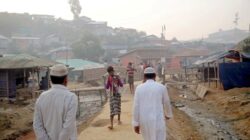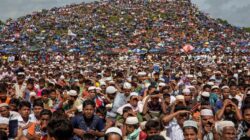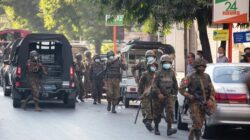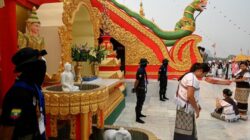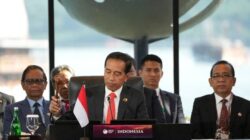DHAKA: Rohingya refugees in Bangladesh have requested repatriation to Myanmar as the world marked World Refugee Day on Monday, five years after hundreds of thousands fled their home country due to a horrific military campaign.
More than 1.1 million Rohingya refugees reside in hundreds of squalid communities in Cox’s Bazar, a fishing town in southeast Bangladesh, where there is no work, terrible sanitation, and little access to education.
Following a rally prohibition imposed following a major 100,000-strong protest in August 2019, officials allowed tens of thousands of Rohingya to demonstrate on Sunday, demanding repatriation to Myanmar.
“We want to be repatriated as long as the demands we made are honored and the atmosphere in Rakhine is favourable,” 24-year-old refugee Osman Johar, who participated in the rallies, told Arab News.
The Rohingya in Cox’s Bazar have requested, among other things, that they be acknowledged as official citizens of Myanmar and that the government stop torturing members of the group and other ethnic minorities in the country.
“At the time, there is no security of life for us in camp.” We do not have the resources to pursue further education. There is no access to adequate healthcare and no freedom of movement. Above all, I want to emphasize that we are not completely protected in the camps,” Johar continued.
Various crimes have occurred in previous years in the overcrowded camps, but the murder of famous Rohingya leader and founder of the Arakan Rohingya Society for Peace and Human Rights, Mohibullah, last September aroused alarm among the refugee community.
A community leader from a rights group, who sought anonymity out of fear for his safety, said refugees felt uncomfortable in Cox’s Bazar camps since there had been incidences of kidnapping, looting, and extortion.
“People live in fear here,” he told Arab News. “We want to go back to Myanmar.” But first, the Myanmar authorities must accept our Rohingya identity.”
According to a UN fact-finding team, the 2017 military campaign in Myanmar, which included executions and forced mass flight of the Rohingya, constituted “genocidal actions.”
Shamsud Douza Nayan, Bangladesh’s extra refugee relief and repatriation commissioner in Cox’s Bazar, claimed the demonstrations on Sunday were peaceful, with thousands of Rohingya taking part.
“The Rohingya gathered in several small groups within the camp sites, demanding their immediate return,” Nayan said.
While negotiations have been stuck for years, the marches on Sunday came after officials from Bangladesh and Myanmar conducted a virtual conference last week to discuss the repatriation of the Rohingya, according to Mainul Kabir, director-general of Bangladesh’s Foreign Ministry’s Rohingya bureau.
“It was really courteous,” Kabir added, “but we still don’t know when we can actually begin the repatriation process.”



